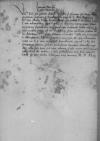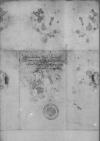List #4839
Ioannes DANTISCUS do Ermland (Warmia) ChapterHeilsberg (Lidzbark), 1543-01-22
Regest polski:
Z listu kapituły z 15 stycznia [IDL 2615] Dantyszek dowiedział się, że kanonicy sprzeciwiają się wspieranej przez niego, króla [Zygmunta I] i podkanclerzego [Samuela Maciejowskiego] kandydaturze szlachcica Mikołaja Loki na kanonię warmińską. W tej sprawie wysyła do kapituły Achatiusa Trencka, kanonika warmińskiego i administratora olszyńskiego, którego niniejszym listem upoważnia i uwierzytelnia.
Rękopiśmienne podstawy źródłowe:
| ||||
Tekst + aparat krytyczny + komentarz Zwykły tekst Tekst + komentarz Tekst + aparat krytyczny
 GStA PK, HBA, C 1a, K. 497, p. 2unnumbered
GStA PK, HBA, C 1a, K. 497, p. 2unnumbered
Venerabilibus Dominis
 GStA PK, HBA, C 1a, K. 497, p. 1unnumbered
GStA PK, HBA, C 1a, K. 497, p. 1unnumbered
Venerabiles Domini, fratres sincere dilecti.
Ex cf.
Quae bene valeant.
Dat(ae) or Dat(um)⌈Dat(ae)Dat(ae) or Dat(um)⌉ ex arce nostra

